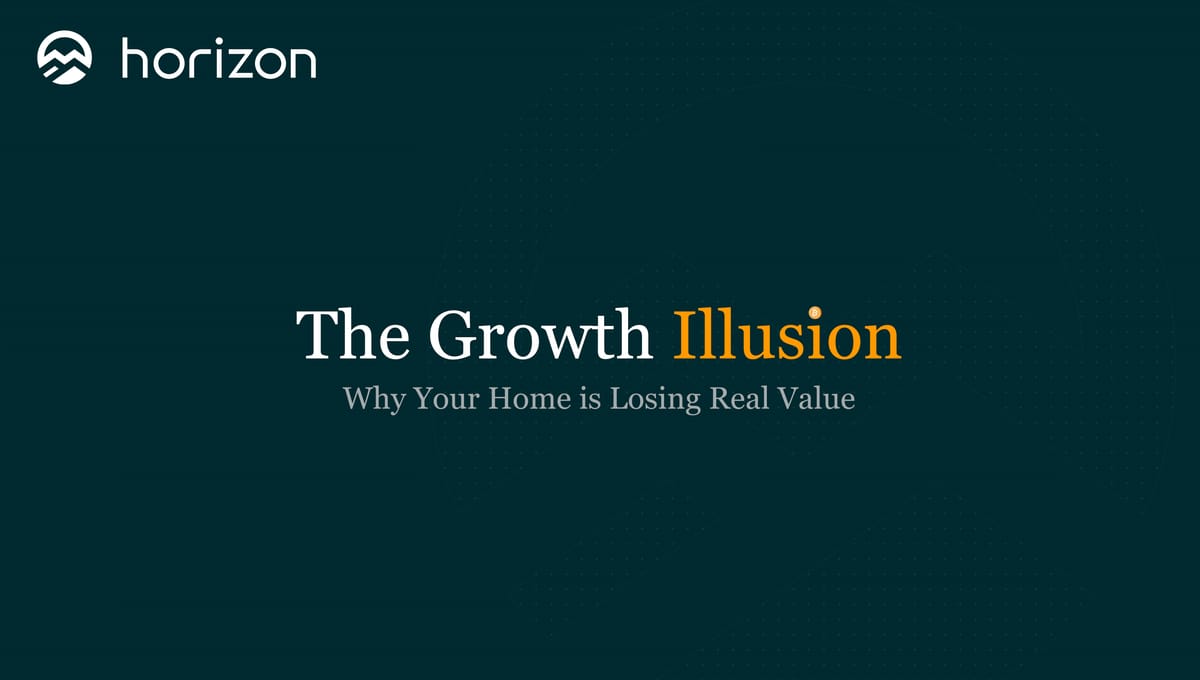The Growth Illusion

At first glance, the American economy appears to be booming. Home values are hovering near all-time highs. The stock market is on an upswing. A 3-bed suburban home purchased a decade ago is now "worth" twice as much. The average 401(k) balance is up. On paper, it looks like wealth is growing.
But this picture is deceiving.
Much of what looks like "growth" is actually the byproduct of a monetary system that prints its way through crises. When the Federal Reserve expands the money supply and injects liquidity into the economy, asset prices tend to rise. But that doesn't mean the value of your home is growing. In fact, it may be shrinking.
Valuing Assets in a Debased World
When we adjust for the relentless expansion of the money supply (Global M2), the illusion becomes clear. Home prices, while rising in nominal dollar terms, have barely kept up with monetary debasement. When priced in real money, like bitcoin, they’ve been steadily losing value for over a decade.
This chart shows what happens when you normalize three major asset classes: bitcoin, home prices, and global M2 money supply. Since 2018, bitcoin has outpaced both inflation and monetary debasement, while homes and fiat liquidity have moved more or less in tandem.
It's a stark reminder: holding assets priced in dollars doesn't guarantee preservation of value.
Nominal vs Real Returns
Another way to visualize the illusion is to strip bitcoin out of the picture and compare only home prices to monetary expansion.
Here, we see the Case Shiller Home Price Index rising nearly in lockstep with Global M2. The "growth" in real estate is just treading water against the tide of money printing. Homeowners may feel richer, but their purchasing power isn't improving in real terms.
Bitcoin: Designed for This
Over the last 12 years, bitcoin has been the best-performing asset in the world. It has outpaced the S&P 500, U.S. bonds, and U.S. REITs. Why? Because it was designed to. Bitcoin has a fixed supply, is resistant to debasement, and operates outside the reach of central bank policy.
While fiat currencies are engineered to lose value over time, bitcoin is engineered to preserve it.
From Dormant to Dynamic: Why Horizon
For most Americans, the majority of their net worth is tied up in their home. But that wealth is dormant. It sits locked away behind the walls of a primary residence, illiquid and unused.
Horizon is a solution that helps homeowners unlock that trapped equity, not to spend, but to strategically redeploy. Unlike traditional tools like cash-out refinancing, HELOCs, or reverse mortgages, Horizon enables homeowners to diversify into bitcoin without taking on monthly payments, interest-bearing debt, or risking foreclosure.
We use a home equity investment framework that is legally familiar, but our focus is different: we empower homeowners to build long-term exposure to the hardest asset on Earth. Through our preferred provider relationships, homeowners get cash upfront in exchange for a share of their home’s future appreciation. Then they use that capital to buy and custody bitcoin directly, with Horizon's secure self-custody infrastructure.
- No monthly payments
- No interest charges
- No credit score impact
- Full use of your home
- Direct bitcoin ownership
For homeowners who want to preserve and grow their wealth in real terms, Horizon provides a unique and compelling path forward. It is not just access to liquidity. It is the opportunity to transform your largest financial asset into what could become your best-performing one.
With Horizon, homeowners can reposition part of their home’s equity into bitcoin without selling their home, without interest, without monthly payments, and without disrupting their lifestyle.
Disclaimer: Horizon is a technology company that helps users buy and custody their Bitcoin and does not directly provide financial or investment services. Horizon connects homeowners with licensed home equity investment providers but does not act as an agent or broker for the homeowner or any third party. Homeowners should consult their financial, tax, or legal advisor before making any investment decision. For additional information, please refer to our FAQ, terms and conditions, and our preferred providers' websites.





